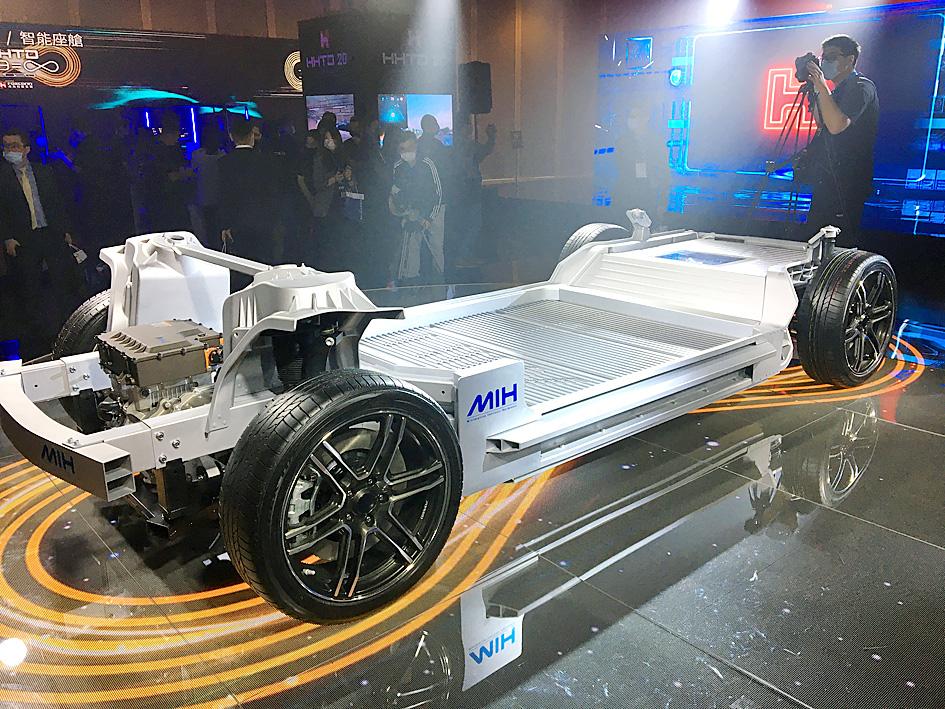Hon Hai Precision Industry Co (鴻海精密) on Saturday said 635 companies have so far joined its open electric-vehicle (EV) development platform, which provides hardware and software to other automakers.
Participants in the MIH Open Platform are to start supplying products by the end of April, Hon Hai chairman Young Liu (劉揚偉) said at an online weiya (尾牙) year-end event for the company’s employees.
The firm has been pushing its “three plus three” plan to expand from manufacturing into hardware and software integration, he said.

Photo: CNA
The initiatives refer to three emerging industries — electric vehicles, robotics and digital healthcare — that are being developed through artificial intelligence, semiconductors and communications technologies.
The development of electric vehicles is central to that initiative, and the aim is to build a supply chain for the industry, Liu said.
Hon Hai employees in more than 20 countries, including Taiwan, Brazil, the Czech Republic, China, India, Japan, Malaysia, Mexico, Singapore, Slovakia, the US and Vietnam, joined the weiya, the company said.
Separately on Thursday, Hon Hai, a key Apple Inc supplier, reported consolidated sales of NT$500.22 billion (US$17.62 billion) for last month, the company’s highest January sales, on the back of robust Apple iPhone 12 sales.
Last month’s figure rose 37.21 percent from a year earlier, the company said in a statement.
Hon Hai’s consumer electronics division posted the strongest growth, followed by the electronics component division, the computer division and the cloud-related device division, it said.
However, sales were down 29.92 percent from December last year, when consolidated sales of NT$713.78 billion exceeded NT$700 billion for the first time in any month since the company was founded.
Neither Hon Hai nor analysts identified specific products or subsidiaries to account for the nearly 30 percent drop.
However, it said in the statement that its cloud-related gadget division fared the best last month, followed by the computer division and electronic components division, with the consumer electronics division seeing the biggest monthly decline.
Meanwhile, FIH Mobile Ltd (富智康), a Hong Kong-listed subsidiary of Hon Hai, reported a net loss of US$175 million for last year, worsening from its net loss of US$12.18 million the previous year.
FIH Mobile manufactures products for non-Apple brands, such as Xiaomi Corp (小米), Oppo Mobile Telecommunications Corp (歐珀), Huawei Technologies Co (華為) and Japan’s Sharp Corp, and has a broad production base in China.
As Hon Hai holds about a 62.8 percent stake in FIH Mobile, the unit’s losses are expected to hurt the parent company’s bottom line, analysts said.

KEEPING UP: The acquisition of a cleanroom in Taiwan would enable Micron to increase production in a market where demand continues to outpace supply, a Micron official said Micron Technology Inc has signed a letter of intent to buy a fabrication site in Taiwan from Powerchip Semiconductor Manufacturing Corp (力積電) for US$1.8 billion to expand its production of memory chips. Micron would take control of the P5 site in Miaoli County’s Tongluo Township (銅鑼) and plans to ramp up DRAM production in phases after the transaction closes in the second quarter, the company said in a statement on Saturday. The acquisition includes an existing 12 inch fab cleanroom of 27,871m2 and would further position Micron to address growing global demand for memory solutions, the company said. Micron expects the transaction to

Vincent Wei led fellow Singaporean farmers around an empty Malaysian plot, laying out plans for a greenhouse and rows of leafy vegetables. What he pitched was not just space for crops, but a lifeline for growers struggling to make ends meet in a city-state with high prices and little vacant land. The future agriculture hub is part of a joint special economic zone launched last year by the two neighbors, expected to cost US$123 million and produce 10,000 tonnes of fresh produce annually. It is attracting Singaporean farmers with promises of cheaper land, labor and energy just over the border.

US actor Matthew McConaughey has filed recordings of his image and voice with US patent authorities to protect them from unauthorized usage by artificial intelligence (AI) platforms, a representative said earlier this week. Several video clips and audio recordings were registered by the commercial arm of the Just Keep Livin’ Foundation, a non-profit created by the Oscar-winning actor and his wife, Camila, according to the US Patent and Trademark Office database. Many artists are increasingly concerned about the uncontrolled use of their image via generative AI since the rollout of ChatGPT and other AI-powered tools. Several US states have adopted

A proposed billionaires’ tax in California has ignited a political uproar in Silicon Valley, with tech titans threatening to leave the state while California Governor Gavin Newsom of the Democratic Party maneuvers to defeat a levy that he fears would lead to an exodus of wealth. A technology mecca, California has more billionaires than any other US state — a few hundred, by some estimates. About half its personal income tax revenue, a financial backbone in the nearly US$350 billion budget, comes from the top 1 percent of earners. A large healthcare union is attempting to place a proposal before